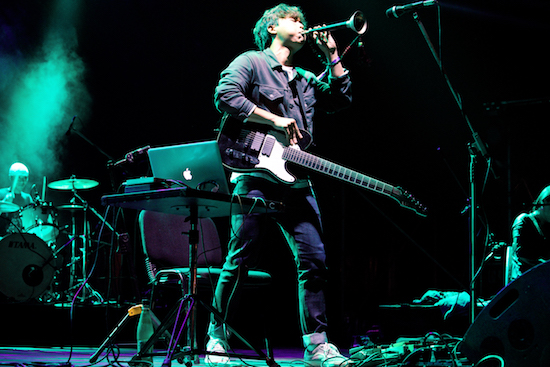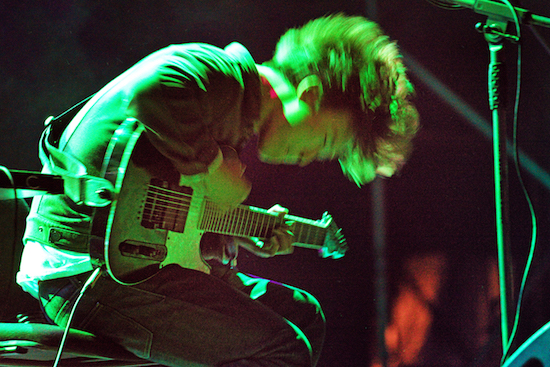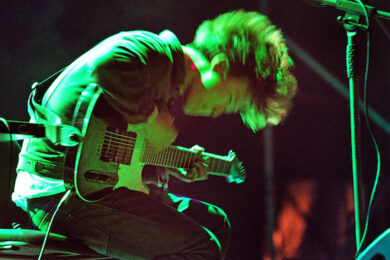It’s nigh on midnight and our transfer car is hurtling down the dual carriageway from Katowice airport towards the centre of town. Sat opposite your correspondent is the intense figure of Willis Earl Beal, a man with no truck for small talk, and in a very short space we’re discussing the nature of identity and the search for a place called home. Currently based in Portland, Oregon, after spending years moving around the United States of America, Beal is no stranger to the itinerant lifestyle but is still keen to one day lay down some roots.
I tell him that my annual return to the OFF Festival is partly down to the need to make some sense of the death of my parents. The offspring of Polish refugees who arrived in England after suffering the horrors of the Second World War, I’ve spent the years since their passing trying to determine who I actually am whilst attempting to honour their memories by acknowledging my own cultural heritage. It may sound corny but because there are no rules or legislation for bereavement, death is something that will knock everyone in all sorts of different personal angles and tangents and this is where I’ve fallen.
Beal nods his head as says, “OK, I can see that. But what is it that you like so much about this country?” And that’s the killer question.
There are plenty of things to like, nay, love about Poland. It could be the elegance of the language, or perhaps the stunning landscapes that boast breathtaking mountains, beautiful lakes, wide-open spaces and dense forestry. The cuisine is always worth writing home about – hearty meals that demand your time in both preparation and consumption – and in turn it’s difficult not to be knocked out by the hospitality afforded to guests and travellers. Likewise its cultural contributions of art, films, design and, of course, music that has, over the centuries through to the present, broken free of borders to reach an ever-growing audience receptive to its charms. But most of all, for this writer at least, it’s the resilience and determination of the country that shines through the most.
Given the scale of invasions and partitions suffered by the country over the centuries, Poland has jokingly been referred to as the revolving door of Europe, but it can all too easy to forget that the country ceased to exist for 123 years until 1918 after it was partitioned for the third time by the Russian Empire, the Kingdom of Prussia and Habsburg Austria. And then, after a mere 21 years after regaining its independence, Poland was invaded by Nazi Germany and the Soviet Union as part of the Molotov-Ribbentrop Pact and then remained a Soviet satellite state until the fall of the Berlin Wall. That’s some serious going to keep a national identity intact under incredible odds and pressure.
It’s an attitude that has served the OFF Festival well. Now its 11th year, this annual gathering of music fans from Poland and across the globe has become renowned for being one of the most eclectic events of its kind in Europe. You’d be hard pushed to find a line-up that comfortably nestles the banging techno of Daniel Avery and the deep house of Kiasmos alongside Mgła’s black metal or the sonic onslaught of Lighting Bolt. Or how about the Sufi trance of The Master Musicians Of Jojouka being played on the same line-up as rock & roll veterans Mudhoney? From a purely artistic point of view, there’s more to find here in a short space of time than just about anywhere else in Europe. More importantly is an audience that’s willing to go with the flow, to listen with ears as open as minds as new sounds, approaches and attitudes fill the air with many an act becoming someone’s favourite new band before the weekend is out. Little wonder, then, that many of the record stalls in the OFF Market Place are doing a brisk trade, and especially on the vinyl format.
And speaking of the market, this is an example how to cater food and drink at a festival. Sectioned off from the musical action, no food or drink is allowed into the main arenas. On first glance, you’d be forgiven for thinking this is a daft idea until you pause to consider the lack of trash strewn around the place and the lack of swivel-eyed pillocks staggering into you and causing a ruck. And besides, with food as good as this – delicious curries, cakes, domestic dishes such as pierogi and outstanding kielbasy as well vegetarian and vegan options – you really want to be able to sit down (and yes, at trestle tables, too) and enjoy your modestly priced food without some pisshead stepping into it or having to consider how you’re being ripped off like you are the vast majority of UK festivals.
But all goes back to the music. This year – and not before time – the OFF Festival has ramped up the volume of homegrown acts. A late Saturday afternoon slot by Rysy on the Electronic Beats stage proves to be one of many domestic highlights. A collaboration between producer Wojtek Urbański and Sonar Soul’s Łukasz Stachurko – sadly they’re not joined, as on record, by Dumplings’ vocalist Justyna Święs – their pumping techno and deep bass grooves prove to be the perfect entrance point for the middle day of the festival. Similarly, JAAA! trade in electronics, though of a far darker variety while Niemoc find themselves at the lighter end of the beats spectrum.
But head and shoulders above everything else on the domestic front is the incredible Friday afternoon set by Zimpel/Ziołek over at the comparatively snug environs of the Experimental Stage. Regular readers of tQ will already be familiar with the works of composer and clarinetist Wacław Zimpel and and multi-instrumentalist Kuba Ziołek, aka Stara Rzeka but together they make a deliciously mesmorising musical brew that by turns beguiles and delights in equal measure. Ziołek is an amazing guitarist whose subtlety and dexterity with his instrument – coupled with what sounds like an open tuning – is manifestly clear and the loops that he sends it through meshes beautifully with the drones created by Wacław Zimpel on a series of keyboards before taking flight with clarinets and saxophones. They deal with lengthy soundscapes and the three instrumental pieces presented today take up their 45-minute time slot yet it all seems to go by so much quicker. This is dreamy music that at once straddles folk and psychedelia while presenting something new and it must surely only be a matter of time before they’re commissioned for soundtrack work.
Yet despite the best laid plans of the festival organisers, this year’s OFF isn’t without its problems. No less than four acts – The Kills, GZA, Wiley and Anohni – bail at short notice with some citing illness and others not, and it’s worth bearing in mind here that two of those are headliners. Now, under normal circumstances – and by ‘normal circumstances’ we mean judging a scenario through the eyes of what might happen at home – there would be an uproar from fans demanding refunds in light of the absence of said headliner. But not here, not at OFF; in fact, what transpires is a re-juggling of the schedule that turns into one of those ‘festival moments’ that will be spoken of in hushed and awed terms in years to come by those privy to the event. And you can be pretty certain that that’s how it will be spoken of by the band in question: step forward South Korea’s Jambinai.

Originally scheduled to play at 1.40am on the Experimental Stage, the Asian post rockers – here swelled to a quintet for live work – suddenly finds themselves taking the Main Stage at the primetime slot of 10pm and very quickly it becomes apparent that something very special is happening here. Far from taking the stage to an empty arena, they arrive to a sizeable crowd curious to see who is taking GZA’s slot and as their set progresses, that throng increases in size and the volume of cheering and whooping increases exponentially.
The opening drones of ‘Deus Benedictat Tibi’ seem disingenuous at first. The front line of Kim Bo-mi (haegeum), Lee Il-woo (guitar, vocals and piri) and Sim Eun-yong (geomungo) adopt sedentary positions and the sustained dirge created on their traditional instruments pique the interest of the curious. And then it happens: a short, sharp squall of feedback ushers in a fearsome row that’s both repellent and utterly seductive. It takes a moment or two to drink in what’s happening but once the realisation sets in of what’s going to be dealt with here, chatter stops and attention is focussed.
The blending of traditional Korean instruments – the violin-like haegeum and the stringed geomungo – with contemporary blasts of noise and utter fury perfectly sums up the turmoil of the outsider world, of generations clashing over ideas, values and mores, of who holds control and power and yet here, on the Main Stage, these seemingly disparate concepts and conceits are joined in a seamless communion.
Yet there’s more to Jambinai than outright sonic terror and sheer visceral thrills. As displayed by ‘Echo Of Creation’, the band are more than adept at creating beauty from chaos in a way that sometimes eludes their Western counterparts. They tease out those quiet moments having realised that they create as much drama, tension and release as the violent explosions that they’re easily capable of. It’s precisely this blend of cultures, generations, ideas – all brought together under the banner of music – that perfectly encapsulates the objectives and the ideals of the OFF Festival. By time they close with the tear-jerking and undulating beauty of ‘Connection’, the night belongs to Jambinai. The audience applauds wildly, still not quite believing what they’ve witnessed and one suspects that the same applies to Jambinai. The amount of people standing at the front of the stage as Jambinai have their photo taken with them behind them is testament to what’s been achieved by the band, the crowd and the organisers.
Festival chief Artur Rojek takes to the stage to explain the reasons for the absences and changed line-up. He’s genuinely contrite but the feeling from the audience is that they want to give him a hug rather than dish out any grief. It’s that kind of festival.
But why? Why is that kind of festival? Where does that resilience come from? Jarek Szubrycht, one of the festival’s more prominent representatives, believes he has the answer – an understanding between the festival and its audience that minimises the impact of unforeseen circumstances.
“I believe OFF Festival has truly unique audience that’s really passionate about music – they’re here not only to see the headliners but also to discover new music, during the day and on smaller stages,” he explains to The Quietus. “They trust our choices and they keep on returning to the festival every year. We treat them with respect, as friends do, and we believe they perceive us as friends, too. And when a friend gets into trouble, you might feel disappointed and angry – I’d be surprised if they weren’t – but you don’t hate your friend for this.”
He continues: “Another thing is the main idea behind OFF Festival – a well balanced and varied program. We keep on repeating every year that OFF is not about few headliners and mediocre fillers. We’re proud of every single artist we invite to the festival and we have to truly love their music to do so. That is just why bands from middle of the bill are able to fill-in the headlining slots and win the audience – because they’re that good and because people are here for the music, not for the names.”
Not that he takes any of this granted. If anything, he and the other organisers are acutely aware of the need to be on top of their game: “We’re really lucky to have the best festival audience there is and we will work our asses off to prove next year that they were not wrong showing us so much support.”
It’s difficult to shake the feeling that they’ll do just that. And he’s right about the audience that in turn reflects on the event itself. It’s impossible not to take a little bit of the OFF Festival back home with you – the music, the friendships made, the memories and the laughter. This is a fantastic gathering of international music and new ideas and approaches to the artform yet at the same time there’s something uniquely Polish about it all. Sure, there’s the hospitality and the welcome and the thirst for culture but above it all, there’s that sense of resilience and singularity of vision that will hopefully sustain this special annual gathering for many years to come.



